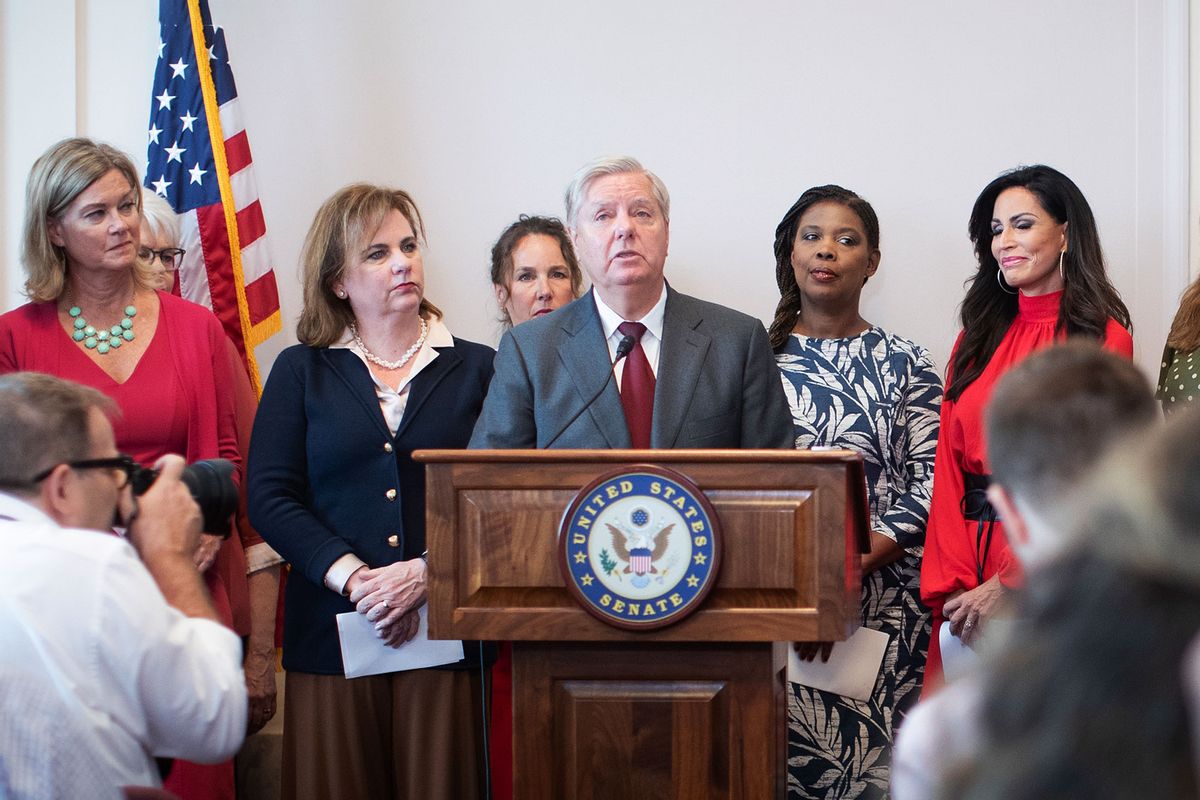In their pantheon of transparently absurd excuses for their war on reproductive rights, the GOP somehow managed this week to come up with a whopper of new one — they just want America to be more like Europe.
With the midterms right around the corner — and sensing perhaps that their initiative for forcing children to bear their rapist's babies or grieving mothers to carry around their dead fetuses may not be so popular with voters after all— Sen. Lindsey Graham, R-S.C., this week floated a new approach. Unveiling the provocatively named "Protecting Pain-Capable Unborn Children from Late-Term Abortions Act" on Tuesday, the senator, perhaps while smoking Gauloises and listening to ABBA, called for a nationwide ban on abortion after 15 weeks gestation. His justification? He claimed the plan "will put the United States abortion policy in line with other developed nations such as France, Germany, Belgium, Denmark, Spain, and other European nations." Yes, because we all know how much Republicans love the way Europeans do things, with their free university systems and their restrictive gun laws and their socialized medicine.
We could just call this an absolute load of utter codswallop and tosh, but let's take a minute and really unpack Graham's sales pitch here.
First, it's telling that Graham includes Germany on that list. Abortion there is technically illegal — though doctors and patients rarely face prosecution. It is also permissible under medical exceptions. Germany, by the way, is a nation still unwinding its reproductive policies that are rooted in its Nazi era. Just this past June, the country got around to abolishing one of those laws, which had restricted doctors from counseling on abortions.
It's true that across many European nations, abortion regulations kick in at around 15 or 16 weeks. In France, the limit is 14 weeks — but it is worth noting that the country has in recent years been moving to expand abortion access, not limit it. This summer, on the heels of the Dobbs decision here, French Prime Minister Élisabeth Borne backed a bill to enshrine abortion rights in the country's constitution. "We must engrave this acquired right in stone," she said at the time.
Though the U.K. is no longer in the E.U., pregnant individuals in the country can get an abortion at up to 24 weeks, and past that date if medically necessary. In Ireland (which is an E.U. country), where the constitutional ban on abortion was overturned in 2018 — in no small part because enough were sick of the Catholic Church being cool with letting pregnant people die — termination is accessible up to 12 weeks, later if necessary. And this is a nice touch: even in cases where it is not legal, "criminal provisions do not apply to a woman in respect of her own pregnancy."
In his baffling rationalization that a nationwide limit on abortion would give the U.S. some of that continental je ne sais quoi, Graham has, first and foremost, likely wildly overestimated his base's interest in taking policy cues from people who call soccer "football" and drink their beer at room temperature. More than that, though, he's conspicuously excised a great deal of the context around the European approach to reproductive healthcare.
Let me offer an example. While Graham didn't mention the Netherlands in his statement, I happen to be studying its reproductive health system at a Dutch university right now. And guess what? Abortion is readily available up to 24 weeks, with exemptions for later intervention for nonviable fetuses and emergency situations. The Netherlands also has comprehensive and early sex education, universal healthcare, free birth control if you're under 21 and low cost contraception for everyone else, and — Lindsey's not going to like this — one of the lowest abortion rates in the world, and a significantly lower maternal mortality rate than the U.S.
Every healthcare system has its drawbacks, and Europe no different from anywhere else. There is tremendous progress yet to be made there for better abortion care, miscarriage management and prenatal — because you can't have one without the others.
But when your populace has better access to education and contraception, when early abortion is relatively easy to obtain, safe, and free or low cost, when pregnant people and their doctors are not afraid of going to jail for making difficult medical decisions, when they are not afraid of being murdered, those other limitations don't line up at all with what Republicans are proposing for the U.S. Not at all. It's a shameless falsehood. And for a guy who has spent years vowing to "stop the government takeover of healthcare," it seems a little peculiar now that Lindsey Graham insists he just wants America to be more like Europe, of all places.



Shares